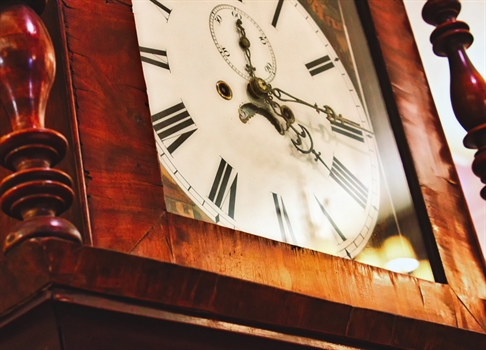The comforting tick of a longcase clock is characteristic of many homes. Antique clocks, and some modern clocks, can be temperamental so when the time comes to store a grandfather or grandmother clock, it’s worth taking a little extra care. This will ensure that your clock continues to keep good time when you are ready to put it back in your home.
Should I get my grandfather clock serviced before storage?
Clock experts are divided about the need for servicing grandfather clocks. Some recommend a service every few years. Other say that if your antique clock is clean and running happily it does not need expert attention. You could apply a little clock oil, though.
If the movement of your clock is black with dirt and tarnish, then it’s worth getting it looked at by a clockmaker. The British Horological Institute can help you find the right clockmaker for the job. By speaking to them before storing your clock, you can get tailored advice on servicing your longcase clock, and they may even make some recommendations about storage.
Before you store your clock
When you store your clock, remove any accessories and keep them with the case. This ensures that they are to hand when you bring your clock out of storage. Check whether the finials on the case unscrew. They are vulnerable to damage while the clock is being moved. Glass panels are particularly vulnerable, so take extra care with these. You may want to remove them and give them extra protection. Don’t forget the key, as well.
Protect your clock when moving it
To keep your clock looking handsome, be sure to protect it from bumps and scuffs during the moving and storage process. Bubble wrap will guard it during the move, but if it’s going into long-term storage, it’s better off with a breathable cover.
Grandfather clocks should be handled with care during a move, for example, it may be best to keep it upright. Take your time, get help and plan your route. Consider using professional removers if your clock is very precious and you are not confident doing the job yourself.
Climate-controlled storage is best for antique clocks
Sharp changes in temperature and humidity can have devastating effects on antiques, particularly clocks with wooden cases. Warps or cracks in the wood may affect the clock’s movement, and how it keeps time. So to keep your grandfather clock accurate, the best thing you can do is store it in a steady environment. Some domestic storage centres offer climate-controlled storage, that is an environment in which temperature and humidity fluctuations are kept to a minimum. Read more about climate-controlled storage in our blogpost.
When you put your grandfather clock into climate-controlled storage, you can be confident that it will stay in tip-top condition until you are ready to put it in your home again. But what if the worst happens at your storage unit and there is a fire or a flood? Is your personal property covered in a storage unit? Most storage companies require you to insure your stored property. It’s quick and easy to arrange insurance for your stored clock with Store and Insure . Your policy lasts as long as you need it to, and your goods are even insured when you are moving them in a covered vehicle between your home and your storage unit.
It is unlikely that you will be the last owner of your grandfather clock, so it’s worth taking extra care of it, both in your home and in storage. Care for your clock and it will keep good time for the rest of your life.





